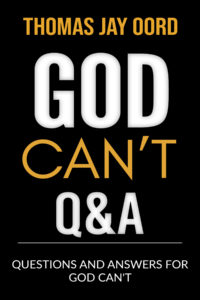Can an Uncontrolling God Do Miracles?
Readers of my book God Can’t appreciate that an uncontrolling God neither causes nor allows evil. But many assume this God cannot do miracles. Not so fast!
In my book, Questions and Answers for God Can’t, I devote a chapter to answering the question: “If God is uncontrolling, how do we explain miracles?” This blog essay offers a small excerpt from that chapter. I encourage you to get the book, of course. Here’s a link for it.
Miracles in the Bible
In previous books and essays, I’ve discussed various biblical accounts of miracles. I’ve said biblical miracles are good and unusual events that involve God’s action in relation to creatures or creation. I’ve said God acts to do miracles, but creatures and entities must cooperate, or the inanimate conditions of creation must be conducive for those miracles to manifest.
Writers of scripture use various words when talking about miracles, and those words are interpreted as wonders, signs, powers, energies, and more.[i] Some miracles involve complex or simpler agents, such as healings, exorcisms, resurrections, insights/revelations, salvation, and more. Others involve inanimate creation, such as Moses parting the Red Sea, Jesus feeding 5,000, walking on water, floating ax heads, and more.[ii]
Instead of rehearsing all of the arguments and examples of miracles I’ve addressed in various books and essays, let me make an overarching claim…
I know of no biblical passage that contradicts my definition of a miracle. Many support it; others are neutral.
To put it differently, I know of no passage that says miracles require God to control creatures or creation. No story or passage of Scripture explicitly says God singlehandedly brought about some miraculous result.[iii]
Creaturely Cooperation
Most biblical miracle stories explicitly mention the actions of God and creatures. They describe creaturely response (e.g., “Your faith has made you well” [Mt 9:22; Mk 5:34. 10:52; Lk 8:48, 17:19, 18:42]) or the conditions of creation (e.g., “water stirs” [Jn 5:4]).
Most miracles involve agents: people, animals, angels, organisms, and cells. My understanding of miracles fits these Bible stories well. Some miracles involve inanimate objects and aggregates. My understanding of miracles fits those too, but those conditions of creation must be conducive.
Several biblical passages support my claim that creatures can stop miracles from occurring. Particularly interesting are those that say God does not heal everyone or cannot heal at all. Jesus goes to his hometown of Nazareth, for instance, and cannot do miracles. The Nazarenes didn’t cooperate.
Other passages speak of Jesus healing many, but not everyone. One recounts how Jesus spit on dirt, put it in a blind man’s eye, and the blind man received partial vision. So Jesus tries again. Examples such as these suggest various factors, actors, agents, and forces play a role in miracles.
Without creaturely cooperation or conducive creaturely conditions, miracles cannot occur.

God Does Miracles Alone?
Admittedly, a few Bible stories mention only God acting. A miracle occurs, but there’s no mention of creaturely cooperation or the conditions of creation. Sometimes, only God is mentioned as healer. For instance, the writer of Exodus quotes God saying, “I am the Lord who heals” (15:26).
Many readers of the Bible encounter miracle passages in which only God is mentioned and assume God singlehandedly brought about the miracle. But is this assumption warranted?
When we read Scripture, we should ask, “Does a miracle story that only mentions God explicitly say there was no creaturely cooperation or contribution?” As I read the Bible, I can’t find any passages overtly saying God alone brought about some miracle.
In fact, I know of no verse — from the creation of the world, to the hardening of Pharaoh’s heart, to the resurrection of Jesus, to other miracles, and to the eschatological end — that explicitly says God alone brought about some result.
God Controlled Pharaoh?
Some readers of God Can’t ask me specifically about God hardening Pharaoh’s heart. They wonder if in this story God controls others. When we read the story carefully, we may notice biblical writers say God hardened Pharaoh’s heart and Pharaoh hardened his own heart (Ex 7:13; 8:11,15,32; 9:34).
I agree with eminent biblical scholar Terence Fretheim when he writes, “an act of hardening does not make one totally or permanently impervious to outside influence; it does not turn the heart off and on like a faucet.” “Divine hardening did not override Pharaoh’s decision-making powers,” he adds.[iv]
Pharaoh’s heart hardened because he negatively reacted to signs from God. These signs originated in God, so writers rightly portray divine action as playing a role. But God did not control Pharaoh with these signs; Pharaoh decided how he would respond to them. Pharaoh’s responses played a necessary role in the hardening of his heart.[v]
Creatures Do Miracles without God?
I find another set of biblical stories interesting. These stories describe something good and unusual – some even use the word “miracle” – but never mention God.
The classic Old Testament story for this is the book of Esther. Even more interesting is the story of Peter healing with just his shadow, with no mention of divine action (Acts 5:15). Handkerchiefs and aprons bring healing and exorcise demons, but the writers never mention God working (Acts 19:12).
How should we interpret these “Godless” passages?
The vast majority of theologians think God was active in those biblical miracles that don’t mention God. These theologians say God was working alongside creaturely agents, forces, and factors. When Esther miraculously saves her people or Peter’s shadow heals the sick, God was a necessary cause in these good and unusual events. I agree.
But… if for theological reasons we assume God was active although not mentioned in some biblical miracle accounts, why can’t we for theological reasons assume creatures were active although not mentioned in other biblical miracle accounts?
Assuming God and creation always play roles in miracles resolves mysteries and offers a plausible framework for understanding God’s action in the world.
The Bible in general supports my theory of miracles.
(This is a small portion of my chapter answering the question, “If God is uncontrolling, how do we explain miracles?” For the whole chapter and book, see this link.)
Footnotes…
[i] For helpful references on miracles, see Craig S. Keener’s work Miracles: The Credibility of the New Testament Accounts, 2 vols. (Grand Rapids: Baker Books, 2011) and Paul Alexander, Signs and Wonders: Why Pentecostalism Is the World’s Fastest Growing Faith (San Francisco: Jossey-Bass, 2009).
[ii] See The Uncontrolling Love of God, ch. 8.
[iii] For a general discussion of biblical reasons for denying that God controls, see Terence E. Fretheim, About the Bible: Short Answers to Big Questions, rev. ed. (Minneapolis: Augsburg, 2009), pp. 93-98. 14. For a Pentecostal-Charismatic argument similar to my own, see Joshua D. Reichard, “Of Miracles and Metaphysics: A Pentecostal-Charismatic and Process-Relational Dialog,” Zygon: Journal of Religion and Science 48 (2013): 274-93. See also Amos Yong, in The Spirit of Creation: Modern Science and Divine Action in the Pentecostal-Charismatic Imagination (Grand Rapids: Eerdmans, 2011), ch. 4.
[iv] Terrence Fretheim, Exodus: Interpretation (Philadelphia: Westminster John Knox, 2004), 97, 99.
[v] Brevard Childs, another eminent Old Testament scholar, argues like I do in his commentary, The Book of Exodus: A Critical, Theological Commentary (Louisville, KY: Westminster John Knox, 2004), 174).



Comments
Ok, I’ll bite. How about Jesus walking on water, and the resurrection? Were there factors of human cooperation or natural phenomenon involved in those? They seem pretty God-specific to me. Or maybe Jesus had a stand-up paddle board and you subscribe to the swoon theory?
Thanks, Jim. I cover the resurrection in the book. It fits my theory well. But I admit walking on water is more difficult. It doesn’t undermine my theory, I just have to talk about water suspending a person. Thanks for asking!